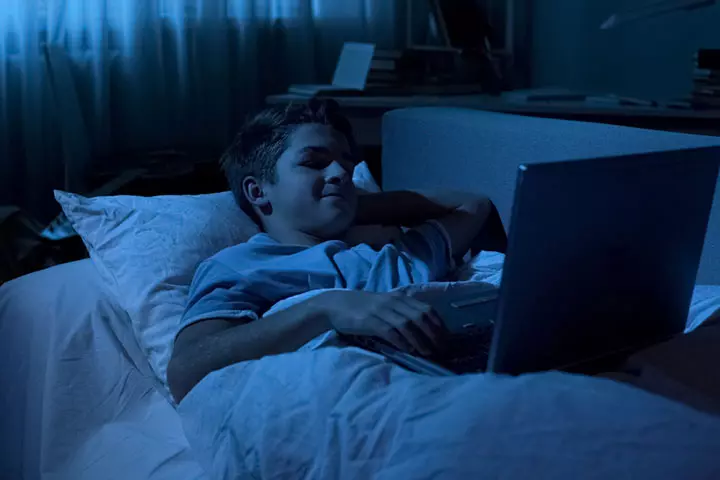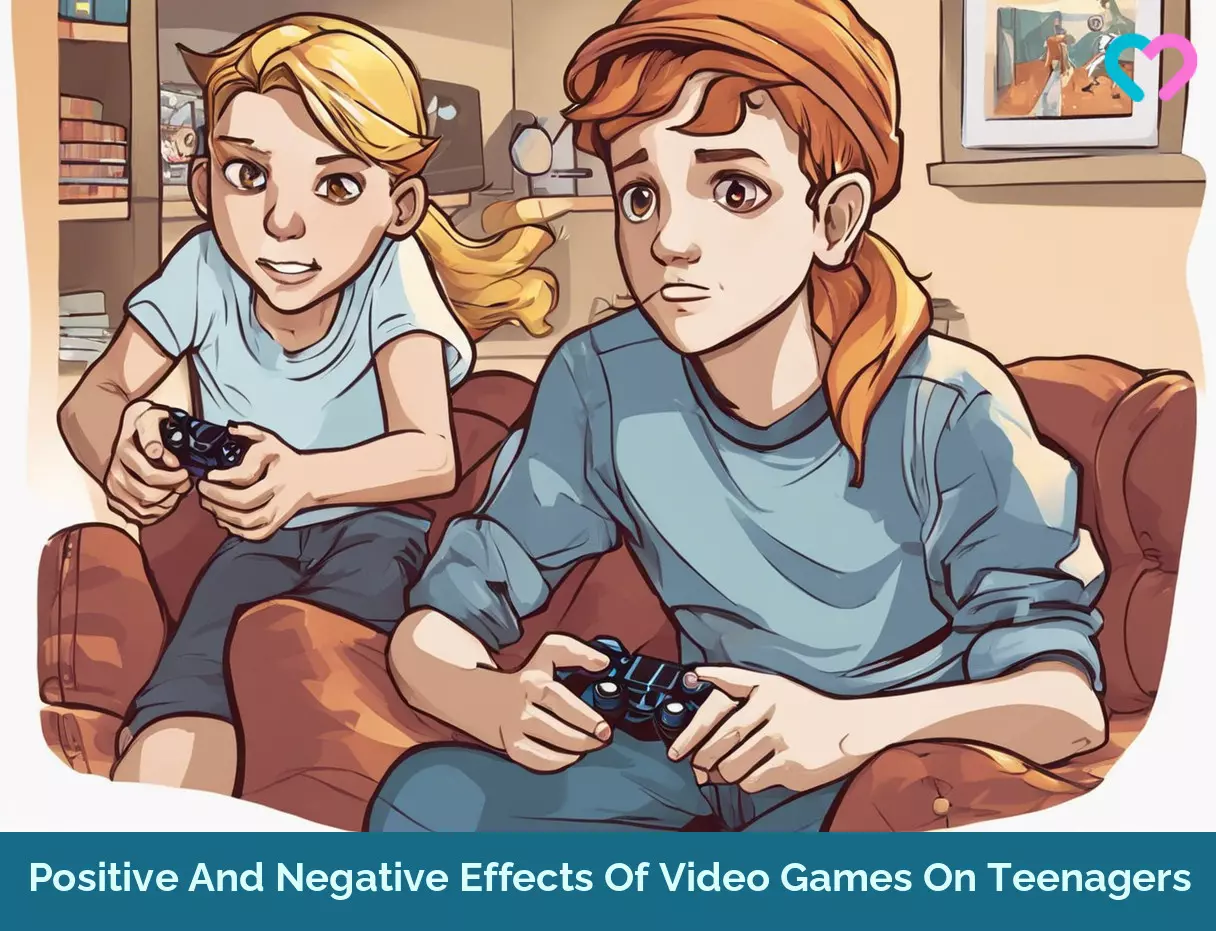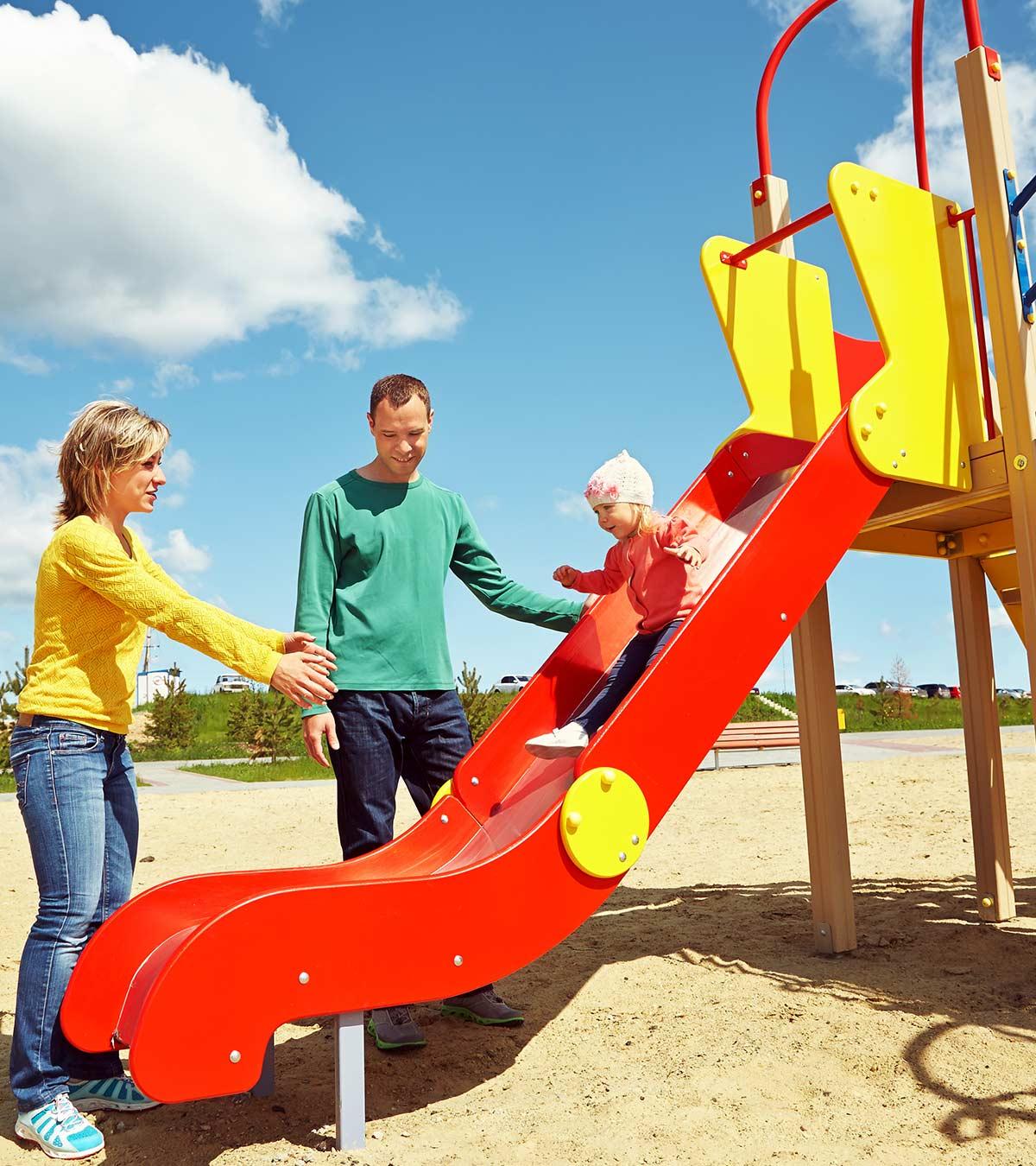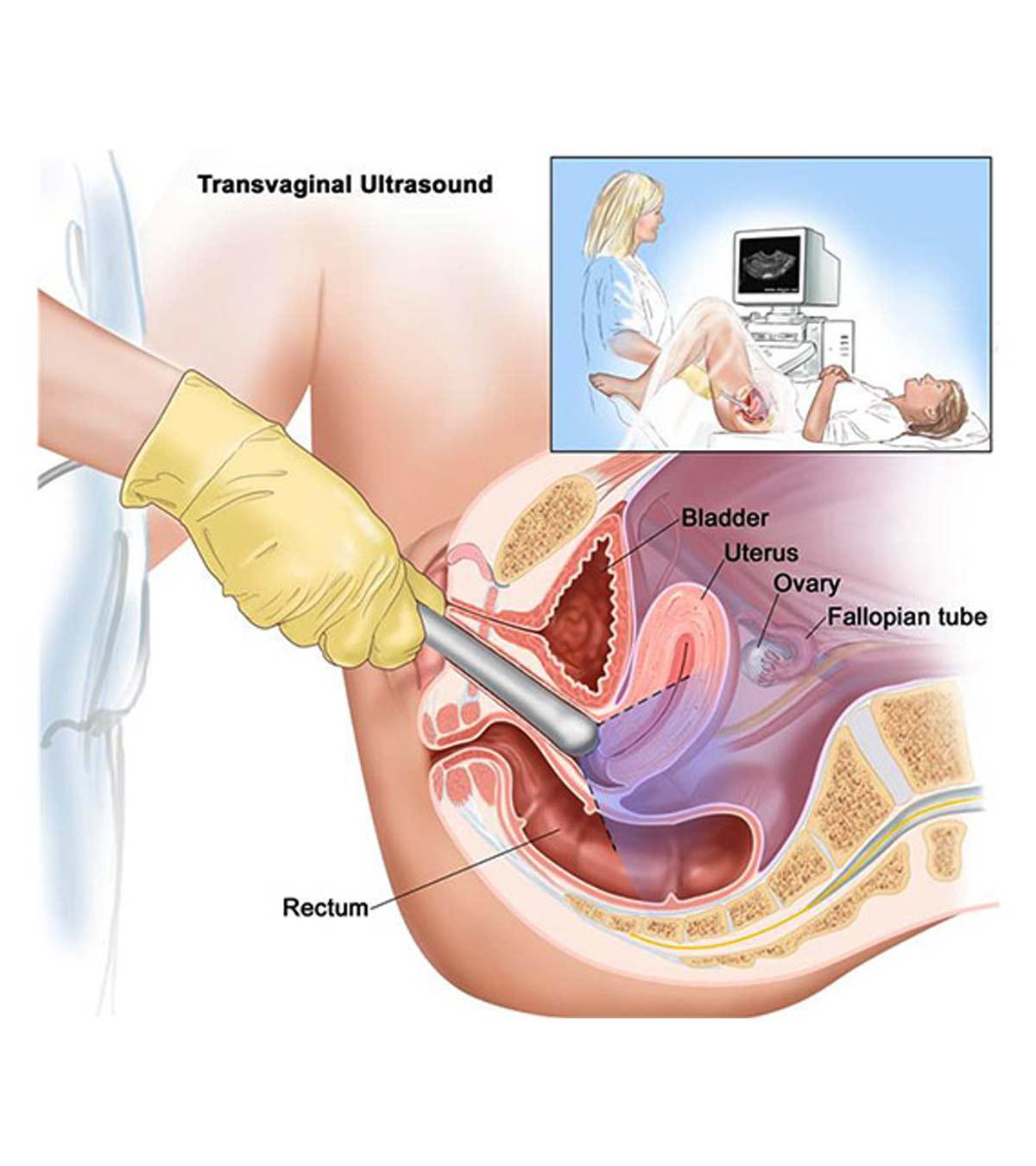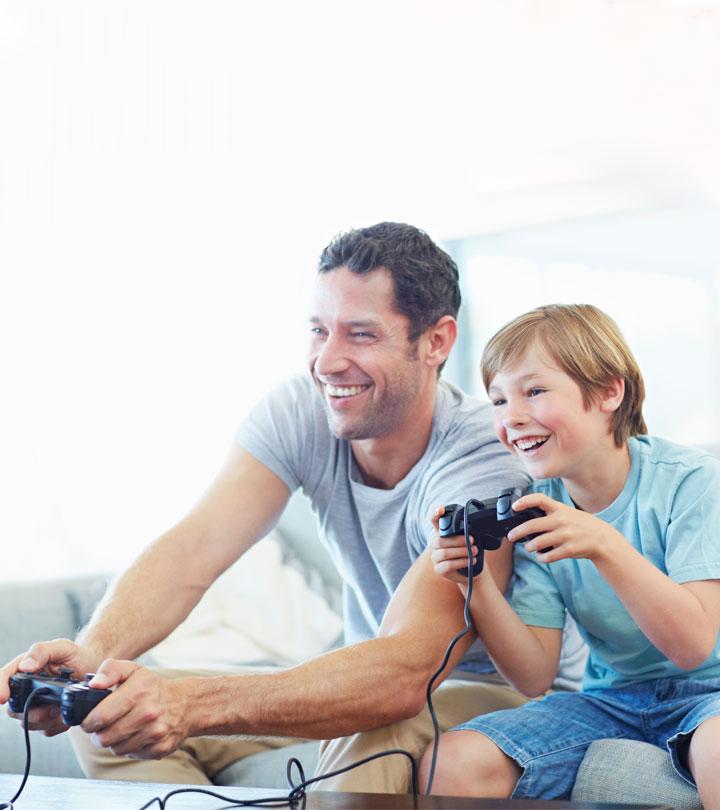
Image: ShutterStock
When you find your teen often sitting with their video games or multitasking when playing, you may be wondering about the possible effects of video games on teenagers. We may hardly know a teen who dislikes playing video games and electronic sports (esports). Consequently, a study found out that 97% of teens and children indulge in playing video games and mobile gaming for at least an hour a day in the US (1). Read on as we present a detail of the negative and positive effects of video games on your teen, some signs of video game addiction, and useful tips for managing the same.
Positive Effects Of Video Games On Teenagers
Yes, video games can be good for your child. Don’t be shocked, we’ll tell you why. Here are the reasons why virtual gaming can be good (1) (2).
1. Improves cognitive functions:
A cross-sectional study conducted on 2217 children by the Department of Psychiatry, University of Vermont, Burlington, relieved that a small level of increased cognitive function was observed in the children who played video games compared to those who did not.
Contrary to popular belief, video gaming can enhance multiple cognitive skills such as better allocation of attention, visual processing, memory, reasoning, and perception, according to research published by the American Psychological Association.
Researchers have studied a meta-analysis of video games and concluded that the positive effects of violence in games included improvement in a player’s capability of thinking in different dimensions, just the way some academic courses do.
2. Hand and eye coordination:
Research has shown that teens can learn spatial, visual and hand-eye coordination skills from video games, especially from shooter games
. Some games require a great deal of these skills to be successful. For example, players need to keep track of positions, speed, aim, directions and more. The brain processes all this data and coordinates with the hands since all the actions are performed with the keyboard or game controller.
Lead author of the research Isabela Granic from the Radboud University Nijmegen in The Netherlands, says, “This has critical implications for education and career development, as previous research has established the power of spatial skills for achievement in science, technology, engineering, and mathematics.”
3. Quick thinking and accuracy:
The action in video games prepares gamers to make smart decisions in split seconds. Also, they need acute attention to cope with unexpected changes in the game.
 Did you know?
Did you know?4. Work on dexterity:
Online gaming
improves the movement of hands with the mouse and keyboard. They learn to use the shortcut functions on the keyboard and give quick responses.
5. Problem-solving abilities
Researchers suggest that video games can aid teens in developing problem-solving skills because while playing strategic video games like role-plays, young adolescents get better at solving problems.
6. Some games can improve moods and ward off anxiety
Games such as Angry Birds and Bejewelled II are straightforward and bring instant happiness or relaxation and improve moods. Researcher Granic calls it a “fundamental emotional benefit” kids can derive from video games. The games can also teach young people how to cope with failures.
7. Promote the theory of incremental intelligence
Teens, who are encouraged and praised for working on a puzzle or game, develop an idea of progressive knowledge, which is essentially believing that intelligence is not fixed and can be improved; it can be grown with effort and time. This way, video games provide an ideal ground for children to acquire such traits of thoughts.
8. Other benefits
Educational video games can teach school subjects more interactively, and pro-social games can increase empathy in teens.
 Point to consider
Point to considerThe positive effects depend on the games your teen chooses to play. Violent and sexually explicit games are more negative than positive.
The graph here illustrates the percentage of time US teenagers spend playing video games, according to the data collected in 2018 by the Pew research center. When compared to boys, girls are shown to spend less time playing video games.
Time spent by US teen boys on video games
Source: Pew Research CenterNegative Effects Of Video Games
The bad effects of video games are mostly related to the amount of play and the contents of gaming platforms, including gaming genres and gender representation in games.
1. Aggression in teens:
One of the most detrimental effects of playing violent video games is increased aggression in children. A comprehensive meta-analysis involving more than 100 research papers has shown that exposure to violent video games is a causal risk factor for increased aggressive behavior (4).
Some researchers have claimed that violent video games can desensitize children to violence, and lower the likelihood of a pro-social behavior.
2. Addiction to gaming:
Image: IStock
The term ‘pathological gaming’ or video game addiction is being widely discussed in the medical circles though it is not yet classified as any formal disorder in the US Diagnostic and Statistical Manual of Mental Disorders (DSM).
Tom Kersting, a New York-based school counselor and therapist, says, “Video games are designed to be addictive. They target the pleasure-seeking part of the brain that produces dopamine. Gamers are swimming in dopamine, which is not a good thing because too much dopamine is tied to every addiction whether drugs, gambling, or gaming.”
Pathological gamers are likely to develop anxiety, insomnia, social isolation, and depression due to a lack of social interaction.
Moreover, these factors are co-morbid in the sense that they can influence each other. Therefore, pathological gaming can result in depression, anxiety, or social phobia and the latter three can make the child more inclined and attracted to gaming.
3. Poor academic performance:
This is one of the side effects of video games on teens. Playing or streaming video games for long hours can affect your teen’s performance in school. Studies have shown that a higher amount of time spent in playing onscreen games can be associated with lower academic performance.
A survey has shown that 47% of heavy online players got poor grades, while 23% of light users performed better than them (5).
Arthur C Woods, a blogger, shares how he was not motivated and organized enough during his teenage and his poor performance was constantly highlighted by his teachers. He says, “When I was growing up, I remember being told by many teachers that I was not doing my best work and that I was not living up to my potential. And while there may have been some truth in that, it was frustrating to hear that so often. I didn’t care about school. I didn’t care about learning. I just wanted to hang out with my friends and play video games all day. I didn’t make plans — I didn’t think about the future. I only lived for the moment. My entire mindset was about the present and what I wanted right now (i).”
4. Adverse effects on health:
Excessive gaming can have an adverse impact on the teen’s health as they spend more time playing virtual games rather than having some physical exercise. This practice increases the risk of childhood obesity. Sometimes, children also skip meals and sleep to play games they are addicted to. The constant glare from the screen can also harm the child’s eyesight in the long run.
You can avoid these negative effects on your children if you keep monitoring their activities.
 Quick fact
Quick factTips For Managing Teen Media Consumption
Image: IStock
As a parent, you can do certain things to mitigate the negative effects of video games on kids’ behavior and achievements.
- Research and know the content and rating of the video games your teen is playing.
- Do not install any video game equipment in your kid’s bedroom.
- Set limits on how long and how often your teen can play the games.
- Set parental control in devices and monitor your child’s media consumption from television, internet, and video games.
- Discuss with your child about their feelings and observations about the games they play. What is it that drives so much interest in them?
- Discuss with other parents to know more about certain video games and share ideas to help each other understand the facet of kids.
- Be a good role model for your child and limit your own screen time.
- Talk to the young adults about the various aspects of media, the positives and negatives of too much exposure to screens, and the balanced use of screen time.
- Have family time and take up activities that do not involve screens. Or take the initiative to go out with your family every week or weekend to take a complete break from digital media. Even one screen-free day in a week can make children realize that the digital world is not everything.
Kersting observes, “Once the stimuli (video games) is removed it leads to withdrawal, irritability, and even assaultive behavior. The good news is that if the stimuli is removed (games), it will take the brain about 30 days to rebalance itself and restore homeostasis.”
 Quick tip
Quick tipIf your teen is spending excessive time on gaming, then you should look out for the symptoms of addiction.
Symptoms Of Video Game Addiction
Do you feel your child is spending too much time playing on screen? Then look out for these signs and symptoms:
1. Excessively preoccupied:
If your teen is suffering from video game addiction, they are preoccupied with the game even when they are away from playing.Video games are harmful if a teen is excessively occupied with it.
2. Lacks control:
A video game addict cannot control the amount of time they spend on the computer. They might start playing with the intention of spending just 20 minutes, but prolong it for hours. This impacts their studies and other hobbies.
3. Neglects other things in life:
Image: Shutterstock
Your teen prefers staying home and playing games to going out or spending quality time with friends. They may also perform poorly in studies.
4. Becomes a spendthrift:
The money you give them or they earn through part-time jobs all goes into buying gaming items. They continuously upgrade software and hardware packages and accessories and don’t mind the costs involved.
5. Gets defensive
They do not want to discuss their gaming addiction with you. They snap at you when you ask them about their time spent on gaming. It is an indication that something is wrong, especially if they look unconcerned that their friends and family are feeling left out from their life.
 Quick fact
Quick factTeenage behavior may change drastically if he or she becomes an addict. You must intervene even if your teen exhibits two or three of the above behavioral patterns.
Measures To Address Video Game Addiction In Children
Image: IStock
Pathological gaming must be treated the same way as any other addiction. So, how do you begin to fight the addiction? Here are some ways to address video gaming addiction among teens.
1. Talk to your teen:
Help your teen recognize their compulsive behavior. They might be adamant and deny that there is anything wrong with them, but do not lose hope or patience. Tell them how you are worried to see them spend such long hours gaming. Try not to be judgmental. They may feel embarrassed.
2. Limit the time:
Do not take away their gaming console or computer to bring them out of the problem. They might become adamant and continue playing outside your home, which could be even more troublesome. Instead, discuss with your child, and set time limits. Allocate some time every day when they can play the game. You may reduce the playtime gradually from three hours a day to two, one and so on.
Encourage your child to stick to the schedule, and set an example by keeping your laptop and smartphones away.
3. Consult a therapist:
If your efforts at home are not working, take them to a therapist or enroll them in a de-addiction program. Counseling will lead to the path of recovery.
4. Cognitive behavioral therapy or CBT:
The therapist may also recommend cognitive behavioral therapy that focuses on changing the child’s thoughts and feelings. It is the most popular approach to video gaming addiction. It involves replacing unhealthy thoughts about games with something constructive and reducing the time spent on playing games. You have to work on it by giving rewards for following new rules, making constant reminders to stop playing and involving the teen in other activities (5).
Frequently Asked Questions
1. Can playing video games lead to exposure to inappropriate content for teenagers?
Playing video games can lead to exposure to inappropriate content for teenagers, such as blood and gore, intense violence, strong venereal content, and use of drugs, which are present in popular games (10).
2. To what extent do video games shape the values and beliefs of teenagers?
Playing violent video games is associated with a decline in benevolence and empathic concern, leading to a reduction in prosocial behavior in teenagers. This change may be due to the exposure to violent content in video games, which can have a negative impact on attitudes and beliefs (11).
The effects of video games on teenagers may not be that bad if they play within limits. Gaming continuously for hours together can make them detached from outside life. And if you have introduced your teen to gaming, it is your responsibility to keep a check on the kind of games they are playing and the duration. You may strictly monitor to avoid waste of time. You don’t have to go against your child or restrict them from doing what they enjoy. Instead, try incorporating other activities into their lives strategically and constructively for their overall development.
Infographic: Effective Strategies For Managing Teen’s Gaming Activities
Teenagers spend a lot of time in front of screens, playing video games. While it can be engaging and entertaining, indulging in gaming for longer periods can be detrimental to their mental and physical health. So, look at the infographic below to discover valuable ways to manage your teen’s gaming time.
Illustration: Momjunction Design Team
Key Pointers
- Playing video games is one of the most common pastime activities among teenagers.
- Video games can help improve hand-eye coordination, cognitive functions, and thinking abilities.
- Long-term video game play can have negative effects on teens, leading to gaming addiction and poor academic performance.
- Spending time outside with your teens and effective communication about their interest in video games can help encourage them to spend less time on screens.
Image: Stable Diffusion/MomJunction Design Team
Playing video games can affect your brain in both positive and negative ways. Learn how to maximize the benefits and minimize the risks.
Personal Experience: Source
MomJunction articles include first-hand experiences to provide you with better insights through real-life narratives. Here are the sources of personal accounts referenced in this article.
i. Can my teenager perform better at school?https://medium.com/@ArthurCWoods/can-my-teenager-perform-better-at-school-by-arthur-c-woods-7cb544743692
References
- The Benefits of Playing Video Games.
https://www.apa.org/pubs/journals/releases/amp-a0034857.pdf - Video Games Play May Provide Learning Health Social Benefits Review Finds.
https://www.apa.org/news/press/releases/2013/11/video-games - Craig A Anderson et al.; (2010); Violent video game effects on aggression empathy and prosocial behavior in eastern and western countries: a meta-analytic review.
https://pubmed.ncbi.nlm.nih.gov/20192553/ - Generation M2.
https://www.kff.org/wp-content/uploads/2013/01/8010.pdf - Overview – Cognitive behavioural therapy (CBT).
https://www.nhs.uk/mental-health/talking-therapies-medicine-treatments/talking-therapies-and-counselling/cognitive-behavioural-therapy-cbt/overview/ - Video Games Lead to Faster Decisions that are No Less Accurate.
https://rochester.edu/news/show.php?id=3679 - Video game playing tied to creativity.
https://msutoday.msu.edu/news/2011/video-game-playing-tied-to-creativity - The health effects of too much gaming.
https://www.health.harvard.edu/blog/the-health-effects-of-too-much-gaming-2020122221645 - 5 facts about Americans and video games
https://www.pewresearch.org/short-reads/2018/09/17/5-facts-about-americans-and-video-games/ - Protecting children from the dangers of virtual violence
https://www.health.harvard.edu/newsletter_article/violent-video-games-and-young-people. - Violent Video Games, Externalizing Behavior, and Prosocial Behavior: A Five-Year Longitudinal Study During Adolescence
https://scholarsarchive.byu.edu/cgi/viewcontent.cgi?article=4995&context=facpub
Read full bio of Catherine Mok
- Quiara C. Smith is an expert pediatric pelvic health occupational therapist (OT) and owner of a private boutique pediatric pelvic health practice in California and Hawaii. She has been a pediatric therapist for over 13 years, working in the NICU and other settings. Quiara did her masters in OT from Samuel Merritt University and is pursuing her doctorate at Elizabethtown College.
 Quiara C. Smith is an expert pediatric pelvic health occupational therapist (OT) and owner of a private boutique pediatric pelvic health practice in California and Hawaii. She has been a pediatric therapist for over 13 years, working in the NICU and other settings. Quiara did her masters in OT from Samuel Merritt University and is pursuing her doctorate at Elizabethtown College.
Quiara C. Smith is an expert pediatric pelvic health occupational therapist (OT) and owner of a private boutique pediatric pelvic health practice in California and Hawaii. She has been a pediatric therapist for over 13 years, working in the NICU and other settings. Quiara did her masters in OT from Samuel Merritt University and is pursuing her doctorate at Elizabethtown College.
Read full bio of Swati Patwal
Read full bio of Apoorva K






